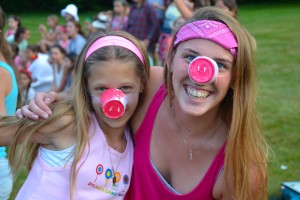 Campers donning big, silly hats and oversized costumes can be found dancing and singing their hearts out on stage at Laurel South. You can see campers giggling in groups, and others transforming into super heroes and villains as their imaginations run wild. Of course, staff members get in on the action too, letting their inner-child emerge by singing, dancing and playing along with the campers. Campers and counselors feel safe at camp; safe to be silly, safe to use their imaginations and safe to just “let go.” They learn right away that camp is a judgment-free space, where they can be themselves and act like a kid. In a world where kids are exposed to adult themes in their TV shows, music and social media, it can be easy for them to lose the silly, magical, goofy part of themselves, in fear of looking “uncool” to their peers. Not at camp, though.
Campers donning big, silly hats and oversized costumes can be found dancing and singing their hearts out on stage at Laurel South. You can see campers giggling in groups, and others transforming into super heroes and villains as their imaginations run wild. Of course, staff members get in on the action too, letting their inner-child emerge by singing, dancing and playing along with the campers. Campers and counselors feel safe at camp; safe to be silly, safe to use their imaginations and safe to just “let go.” They learn right away that camp is a judgment-free space, where they can be themselves and act like a kid. In a world where kids are exposed to adult themes in their TV shows, music and social media, it can be easy for them to lose the silly, magical, goofy part of themselves, in fear of looking “uncool” to their peers. Not at camp, though.
Laurel South encourages campers to be silly in a variety of ways. Programmed “free time” allows campers to explore and socialize with their friends in a way that is supervised, but not highly structured. This gives campers time to use their imaginations. Some campers like to put on skits or host a cabin comedy club. They are encouraged to do and say the silly, kid-like things that come so naturally to them.
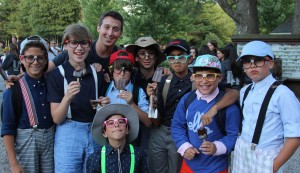 During structured activities, kids are supported when they speak their minds, share their opinions and engage in discussions. They are taught to listen to and respect each other, which gives children the green light to do and say silly things without fear of embarrassment or ridicule. By exploring this side, kids develop a sense of humor. A good sense of humor helps children be spontaneous, to see different sides of a situation, enjoy the playful parts of life and not take themselves too seriously. These character traits are extremely helpful for kids who have a lot of stress and responsibility in school, sports and life back in the real world. A good sense of humor also increases their self-esteem, which is always a bonus!
During structured activities, kids are supported when they speak their minds, share their opinions and engage in discussions. They are taught to listen to and respect each other, which gives children the green light to do and say silly things without fear of embarrassment or ridicule. By exploring this side, kids develop a sense of humor. A good sense of humor helps children be spontaneous, to see different sides of a situation, enjoy the playful parts of life and not take themselves too seriously. These character traits are extremely helpful for kids who have a lot of stress and responsibility in school, sports and life back in the real world. A good sense of humor also increases their self-esteem, which is always a bonus!
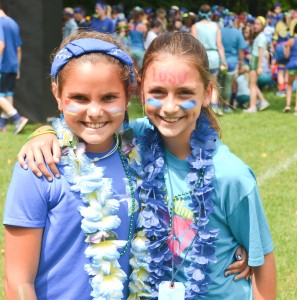 Counselors are counselors because they like kids, and they enjoy seeing the world through the eyes of children. They are fun, relatable and great at being silly. They know they are role models for the campers, so they make it a point to set a good example. When counselors can sing, dance and act silly, campers catch on quickly and begin to feel safe to do the same. They are also a good example of knowing a “time and place” to be silly. They model how to calm themselves down when it is time to be serious, and teach campers how to differentiate between a place where it’s okay to be silly (free time) and a time when being calm and focused is more productive (quiet time in the cabins).
Counselors are counselors because they like kids, and they enjoy seeing the world through the eyes of children. They are fun, relatable and great at being silly. They know they are role models for the campers, so they make it a point to set a good example. When counselors can sing, dance and act silly, campers catch on quickly and begin to feel safe to do the same. They are also a good example of knowing a “time and place” to be silly. They model how to calm themselves down when it is time to be serious, and teach campers how to differentiate between a place where it’s okay to be silly (free time) and a time when being calm and focused is more productive (quiet time in the cabins).
Children are expected to be focused and serious for a large portion of their day in the “real world,” so it is important to foster their childlike wonder and silliness whenever possible. At Laurel South, kids can feel safe to show off their silly side.





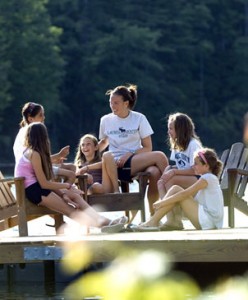
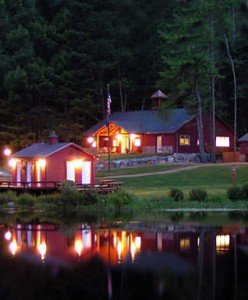

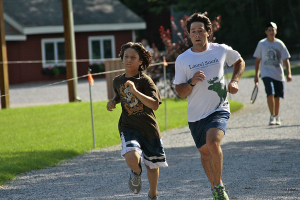
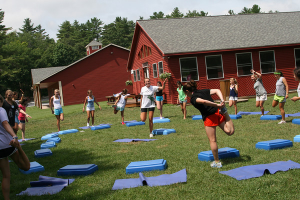
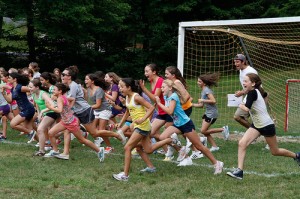
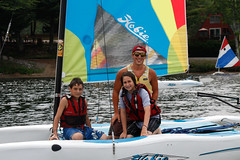 As children mature, they continue to develop and require more experiences where they can make independent choices without parents. If parents don’t allow children to make decisions and do things on their own, they won’t develop confidence or realize that they are not just extensions of their caregivers. It’s a tricky line that parents walk! Sometimes giving children room to spread their wings seems counter intuitive, but in order to grow into a self-reliant adult, children need to struggle without the offer of a quick fix. Even when parents can take care of things, the better choice is to support a child through the process of working through and solving problems. Long after a problem has been forgotten, a self-reliant child will remember hearing, “Wow! You amaze me! You really worked hard to figure that out.”
As children mature, they continue to develop and require more experiences where they can make independent choices without parents. If parents don’t allow children to make decisions and do things on their own, they won’t develop confidence or realize that they are not just extensions of their caregivers. It’s a tricky line that parents walk! Sometimes giving children room to spread their wings seems counter intuitive, but in order to grow into a self-reliant adult, children need to struggle without the offer of a quick fix. Even when parents can take care of things, the better choice is to support a child through the process of working through and solving problems. Long after a problem has been forgotten, a self-reliant child will remember hearing, “Wow! You amaze me! You really worked hard to figure that out.”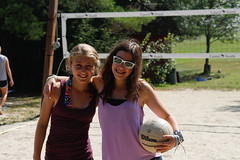 Of course, the
Of course, the 
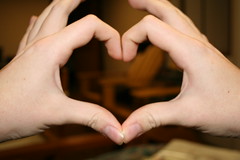 In an earlier post, we discussed one of the primary concerns parents have about summer camp – will my child be safe? This week, we wanted to talk about the people who care for our kids at camp and keep them safe; how they are chosen and trained to do their jobs. When you’re putting the care of your children into other people’s hands, it’s important to have confidence in their caretakers. At Laurel South, not only does every person who works at camp have to love working with kids, they all also have to be good at it and have the skills to be a success.
In an earlier post, we discussed one of the primary concerns parents have about summer camp – will my child be safe? This week, we wanted to talk about the people who care for our kids at camp and keep them safe; how they are chosen and trained to do their jobs. When you’re putting the care of your children into other people’s hands, it’s important to have confidence in their caretakers. At Laurel South, not only does every person who works at camp have to love working with kids, they all also have to be good at it and have the skills to be a success. Of course, selecting the right people is only the beginning of the process of creating a successful staff. The counselors must also be trained and oriented to the camp’s particular processes, schedules and procedures. To do so, all staff must complete a week-long Orientation. We are especially lucky to have large groups of former campers who return to be counselors. They know the camp traditions and songs, and, more importantly, they remember what camp looks like from the point of view of the campers. At Orientation, they can share their experiences with new staff members and serve as ambassadors for our particular mission and traditions.
Of course, selecting the right people is only the beginning of the process of creating a successful staff. The counselors must also be trained and oriented to the camp’s particular processes, schedules and procedures. To do so, all staff must complete a week-long Orientation. We are especially lucky to have large groups of former campers who return to be counselors. They know the camp traditions and songs, and, more importantly, they remember what camp looks like from the point of view of the campers. At Orientation, they can share their experiences with new staff members and serve as ambassadors for our particular mission and traditions. Beyond the formal week long Orientation, over half of the individual activity instructors (waterfront, rock climbing, mountain biking, etc.) come to camp early, with key staff and counselors often training three weeks prior to Orientation. Counselors who are responsible for specific program areas are also trained to write lesson plans and taught how to execute a fun and instructional activity period. Each attends an entire training day devoted to teaching kids their particular activities and making it fun. Finally, every camp staff member is well-trained in general safety procedures and first aid, with additional courses and certifications dependent on counselor responsibilities.
Beyond the formal week long Orientation, over half of the individual activity instructors (waterfront, rock climbing, mountain biking, etc.) come to camp early, with key staff and counselors often training three weeks prior to Orientation. Counselors who are responsible for specific program areas are also trained to write lesson plans and taught how to execute a fun and instructional activity period. Each attends an entire training day devoted to teaching kids their particular activities and making it fun. Finally, every camp staff member is well-trained in general safety procedures and first aid, with additional courses and certifications dependent on counselor responsibilities.
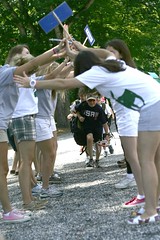 If you’re a summer camp alum, and you had some extra wishes lying around, would you use one to go back to camp? If you could go back today, what would you do? We asked and you answered, on
If you’re a summer camp alum, and you had some extra wishes lying around, would you use one to go back to camp? If you could go back today, what would you do? We asked and you answered, on 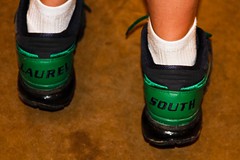
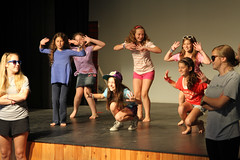 Summer Camp is a time of firsts. The first time you try to catch a ball with a lacrosse stick (and realize you can!). The first time you get on on water-skis. The first time you serve an ace in tennis. The first time you get up on stage in front of hundreds of kids your age. The first time you scale the climbing tower…trot with your very own horse…..Now that camp has ended for the summer and everyone is getting ready for the school year, we thought we’d share some tales from camp. What have the kids taken home with them to last the next 9 months, until camp starts again?
Summer Camp is a time of firsts. The first time you try to catch a ball with a lacrosse stick (and realize you can!). The first time you get on on water-skis. The first time you serve an ace in tennis. The first time you get up on stage in front of hundreds of kids your age. The first time you scale the climbing tower…trot with your very own horse…..Now that camp has ended for the summer and everyone is getting ready for the school year, we thought we’d share some tales from camp. What have the kids taken home with them to last the next 9 months, until camp starts again?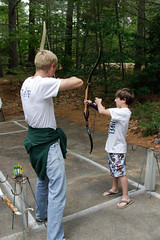 Many families are surprised at the sheer amount of first-time experiences their kids have at summer camp. When Justin, a 12 year old who attended camp this year, was asked to list things he did for the first time at camp, he had quite the list. “I learned how to play guitar, archery, and golf,” he said. During our conversation, it also came out that he also learned new baseball skills and got to play tennis. He also experienced the camp evening programs for the first time, which he raved about as being “fun and creative.” Justin’s going to be talking to a lot of people about camp when he goes back to school. And what is he going to tell them? “I made a lot of new friends and tried a lot of new things. I had the best time!”
Many families are surprised at the sheer amount of first-time experiences their kids have at summer camp. When Justin, a 12 year old who attended camp this year, was asked to list things he did for the first time at camp, he had quite the list. “I learned how to play guitar, archery, and golf,” he said. During our conversation, it also came out that he also learned new baseball skills and got to play tennis. He also experienced the camp evening programs for the first time, which he raved about as being “fun and creative.” Justin’s going to be talking to a lot of people about camp when he goes back to school. And what is he going to tell them? “I made a lot of new friends and tried a lot of new things. I had the best time!”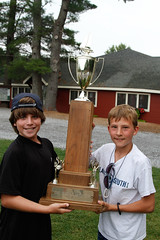 With today’s technology, however, the summer camp community can stay together all year, even when they return to the home cities, states and countries. Camp Laurel South has an active
With today’s technology, however, the summer camp community can stay together all year, even when they return to the home cities, states and countries. Camp Laurel South has an active 
